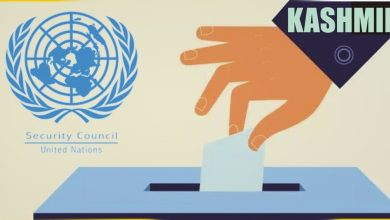 January 5th holds immense significance for the residents of Jammu and Kashmir. The United Nations Commission on India and Pakistan (UNCIP) resolution of 5th January, 1949, provided a road map for free and fair plebiscite that would give the Kashmiri people the right to choose their own destiny. Based on prior UN Security Council resolutions, and in continuation of 13th August 1948, this resolution established a strategy for a democratic and peaceful resolution of the Kashmir dispute.
January 5th holds immense significance for the residents of Jammu and Kashmir. The United Nations Commission on India and Pakistan (UNCIP) resolution of 5th January, 1949, provided a road map for free and fair plebiscite that would give the Kashmiri people the right to choose their own destiny. Based on prior UN Security Council resolutions, and in continuation of 13th August 1948, this resolution established a strategy for a democratic and peaceful resolution of the Kashmir dispute.
The Kashmir conflict is fundamentally rooted in the unresolved status of Jammu and Kashmir. Following its independence from British control in 1947, India experienced a period of unrest. The autonomous state of Jammu and Kashmir’s disputed accession to India led to a protracted conflict with Pakistan. The United Nations intervened and recognized the Kashmiri people’s right to self-determination through a free and impartial vote under its auspices.
The UNCIP resolutions, particularly the one passed on January 5, 1949, provided a comprehensive strategy for conducting this plebiscite. It advocated for the demilitarization of the region and through withdrawal of Pakistani and Indian forces, as part of a phased approach.Nevertheless, the process was slowed by a variety of factors, particularly India’s reluctance to completely engage in the UN-mandated processes, despite the fact, it was India which took the matter to the United Nations Security Council.
The prolonged denial of the right to self-determination in Indian illegally occupied Jammu and Kashmir (IIOJK) has led to profound and far-reaching consequences. The region has remained a powder keg, with tensions simmering beneath the surface and sporadically erupting into violent confrontations. The relentless militarization of IIOJK, bolstered by draconian laws that grant impunity to the armed forces, has entrenched a culture of widespread human rights abuses. These include extrajudicial killings, arbitrary detentions, enforced disappearances, sexual violence against women, the destruction of civilian property, and the imposition of settler colonialism, especially after the revocation of the region’s special status on August 5, 2019.
Voices of dissent have been systematically silenced through decades of state repression, leaving the occupied population voiceless in their own homeland. The conflict has resulted in massive human displacement, along with devastating economic and social consequences.
The people of Kashmir continue to yearn for an agreement that recognizes their inalienable right to freedom of choice. They aspire to a future free from external domination and the constraints of an unresolved dispute, where they can determine their own destiny. The international community must facilitate meaningful dialogue between India and Pakistan, grounded in the principles of justice and equity, to pave the way for a lasting resolution.
The anniversary of the January 5th resolution serves as a poignant reminder of the unfulfilled promise of self-determination for the Kashmiri people. It is a day to reflect on their decades-long suffering and to renew calls for a just and sustainable solution to this enduring conflict. The resolution, adopted on January 5th, 1949, was more than a symbolic gesture; it outlined a clear, democratic path toward resolving the Kashmir dispute.
The resolution’s three-step framework included:
Ceasefire: A ceasefire between India and Pakistan, which was successfully implemented in January 1949.
Demilitarization: A gradual reduction of military presence in the region by both sides. This step became contentious, with disagreements over the extent and execution of demilitarization. While Pakistan proposed a comprehensive reduction, India argued for a more limited approach.
Plebiscite: The final and most critical step—a free and fair referendum under UN supervision, allowing the people of Jammu and Kashmir to determine their future. Unfortunately, this stage was never realized due to persistent differences between India and Pakistan, resulting in the collapse of the entire process.
The failure to hold a plebiscite has had devastating consequences for the people of IIOJK. Decades of conflict have subjected them to widespread human rights violations, including torture, arbitrary detentions, extrajudicial killings, enforced disappearances, lockdowns, curfews, and mass displacement. The delay in fulfilling the promise of self-determination has perpetuated cycles of violence and deepened the humanitarian crisis in the occupied territory.
The anniversary of the January 5th resolution is a bitter reminder of the unmet aspirations of the Kashmiri people. It is also an urgent call to action for the international community to renew its efforts to mediate a fair and enduring solution.
The way forward demands a reinvigorated commitment to justice and equity. A comprehensive dialogue between India and Pakistan, with active participation from the people of Jammu and Kashmir, is essential. The international community must play a proactive role in fostering this dialogue.
Resolving the Kashmir dispute is not merely a bilateral issue between India and Pakistan. It has far-reaching implications for regional stability and global peace. Addressing the aspirations of the Kashmiri people is both a moral imperative and a political necessity. The international community must rise to the occasion, honoring the promise of self-determination and working toward a resolution that upholds the principles of justice, dignity, and peace for all.
The views expressed are solely those of the writer, a student at Abdul Wali Khan University Mardan and an intern at the Kashmir Institute of International Relations. They do not necessarily represent the opinions or stance of KMS.








